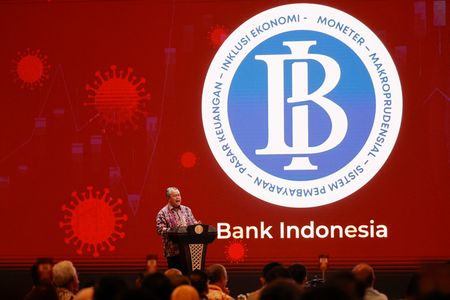 1
1 1
1
By Gayatri Suroyo and Stefanno Sulaiman
JAKARTA (Reuters) -Indonesia’s central bank held policy rates steady for the sixth straight review on Tuesday, saying current levels are enough to ensure inflation stays within its target this year while global uncertainties are expected to ease.
Bank Indonesia (BI) also kept its 2023 economic growth projections unchanged in a range of 4.5% to 5.3%. Southeast Asia’s largest economy grew 5.3% last year.
The central bank kept the benchmark seven-day reverse repurchase rate at 5.75%, where it has been since January, as widely expected in a Reuters poll. Its two other rates were also left unchanged.
BI Governor Perry Warjiyo told a press conference that monetary policy remains focused on ensuring inflation stays within target and the rupiah currency remains stable.
“Going forward, with expectation that the global financial market uncertainty will ease, Bank Indonesia predicts the rupiah exchange rate will appreciate,” he said.
The rupiah came under pressure last year when the U.S. Federal Reserve began aggresively raising rates.
This year, the rupiah has performed well with a 3.8% gain so far, the best among emerging Asian currencies, supported by capital inflows. But it remains sensitive to market risk appetite and bets over U.S. monetary tightening.
BI’s Tuesday decision comes as market participants brace for a likely rate hike by the Fed later this week.
BI expects the Fed to raise rates by 25 basis points (bps) this week followed by 25 bps more in September, and for uncertainty around its tightening cycle to abate by then, Warjiyo said. But he said Indonesia’s rate policy would be dependent on domestic inflation and economic growth.
SHORING UP THE RUPIAH
After the announcement, the rupiah remained mostly unchanged against the dollar at 14,995.
“I think BI’s focus will stay on the rupiah’s stability … to minimise its impact on imported inflation,” said Fakhrul Fulvian, an economist with Trimegah Securities.
As inflation slows, BI will have room to start cutting rates in September, possibly a 50-bp reduction in total by the end of 2023, Fakhrul said.
BI raised rates by a total of 225 basis points between August to January.
Inflation in Indonesia shot up last year amid rising food and energy prices but returned to BI’s 2% to 4% target range earlier than expected in May and is forecast to continue easing. June inflation was 3.52%.
Some analysts predict BI will begin easing monetary policy to bolster the economy amid an expected slowdown in growth as weaker demand and falling commodity prices hit exports.
Warjiyo said economic growth appeared stronger than previously anticipated in the second quarter, but he added that demand for corporate loans had slowed.
BI will from Oct. 1 relax rules on required reserves for banks that lend to some sectors such as property, tourism and metal smelting to support credit growth, which Warjiyo said will free up 47.9 trillion rupiah ($3.20 billion) in liquidity.
($1 = 14,990.0000 rupiah)
(Reporting by Gayatri Suroyo, Stefanno Sulaiman, Stanley Widianto, Ananda Teresia; Editing by Kanupriya Kapoor and Jacqueline Wong)